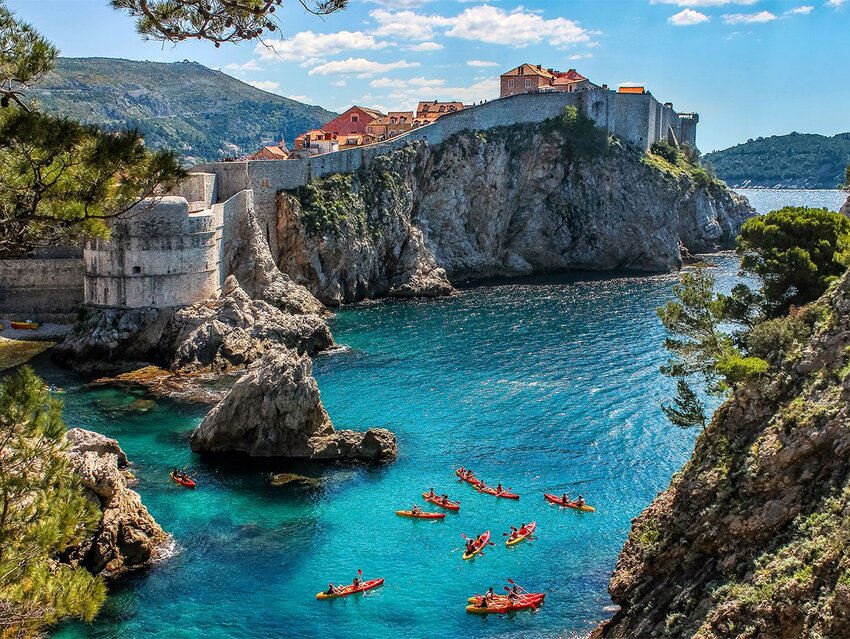A demonym is a word for a resident of a certain place. Most demonyms are predictable — “Pennsylvanians” are from Pennsylvania, “Canadians” are from Canada, and “Bostonians” are from Boston. But where are “Dalmatians” and “Cariocas” from? Some demonyms sound nothing like their place name, and others don’t sound like they apply to humans at all. Let’s take a look at some fun and surprising demonyms from around the world.
Albanian
“Albanian” not only describes a resident of the European country of Albania, but also describes a resident of Albany, the capital city of New York state. Albanian is also a language that is spoken in Albania, Serbia, Kosovo, and other parts of the Balkan peninsula.
Bajan
Bajans are from the Caribbean island of Barbados. This unique term has been around since the 18th century. It doesn’t follow the typical English rules for demonyms, though it is used more than its counterpart, “Barbadian,” which didn’t appear in English until the 1940s.
Cariocas
This not-so-obvious demonym describes residents of Brazil’s most famous seaside city, Rio de Janeiro. The word came from the Indigenous Tupi-Guarani word kari'oka, meaning “white person’s house.” “Carioca” emerged when the Portuguese came to the region and the settlements were called kari'oka by the Tupi. Today, “cariocas” generally describes all people from Rio de Janeiro and is also the name of a traditional dance (the carioca) similar to the samba.
Dalmatian
“Dalmatians” can refer to both people and dogs. The black-and-white spotted dog breed is so popular that Disney even created a few movies about 101 of them. As for the human Dalmatians, they hail from Dalmatia, Croatia, a coastal region on the Adriatic Sea. It’s believed that the dog breed originated there in the 18th century, giving the canines their name.
Dutch
If someone is Dutch, they’re from the Netherlands — but this demonym has a complicated history. The word “Dutch” was derived from the Old English word “thiod” or “theod,” meaning “people or nation.” (This also contributes to why Germany is called “Deutschland” by Germans — the names are etymologically related.) In the 16th century, English speakers began referring to people who lived in the Netherlands and Germany as “Dutch.” “High Dutch” referred to what is now southern Germany, and “Low Dutch” referred to the present-day Netherlands.
When the Netherlands became a separate country in 1815, English speakers began calling it “Holland” (meaning “woodland” in Old English) but still referred to its people as Dutch. Even today, English speakers refer to residents of the Netherlands as Dutch (not Netherlandish or Hollanders, for example). The Dutch, however, call themselves “Nederlanders” in their own language.
Frankfurter
In English, a Frankfurter is both a seasoned sausage (sometimes synonymous with “hot dog”) and a resident of Frankfurt, Germany. The word was adopted into American English in the late 19th century from “Frankfurter wurst,” meaning “sausage of Frankfurt,” because the sausages made in the U.S. closely resembled those made in Germany.
Hamburger
In the same token as “Frankfurter,” a resident of Hamburg, Germany, can be called a “Hamburger” in English. Adding an “-er” to the end of a place name to make it a demonym is common in English (as in “New Yorker”), so it’s no surprise that “Hamburger” exists, although it is convenient that it’s also a favorite American food. In this case, the demonym came before the food. Since the early 17th century, a “Hamburger” was a “native of Hamburg” in English; the namesake meat patties weren’t introduced until the late 19th century.
Neapolitan
“Neapolitan” can describe a person, an ice cream flavor, or a pizza. Since the early 15th century, a resident of Naples, Italy, has been described in English as a “Neapolitan.” The English preserved the Greek name of the city, “Neapolis.” Neapolitan ice cream (typically composed of vanilla, chocolate, and strawberry) was introduced in the 1870s when Italian immigrants brought similar ice cream varieties with them, naming this one after Naples. Neapolitan pizza is a Naples-style pizza topped with tomatoes and mozzarella cheese.
Salemander
A salamander is a lizard-like amphibian, but switch a vowel and you can describe a resident of Salem, Massachusetts. “Salemander” might not be the most widely used demonym for Salem (that would be “Salemite”), but it’s certainly the most fun. In a 2015 poll asking, “What do you call someone who lives in Salem?,” 62% of residents voted for “Salemite,” but the runner-up was “Salemander.”
Featured image credit: Laurens Verhoeven/ iStock

